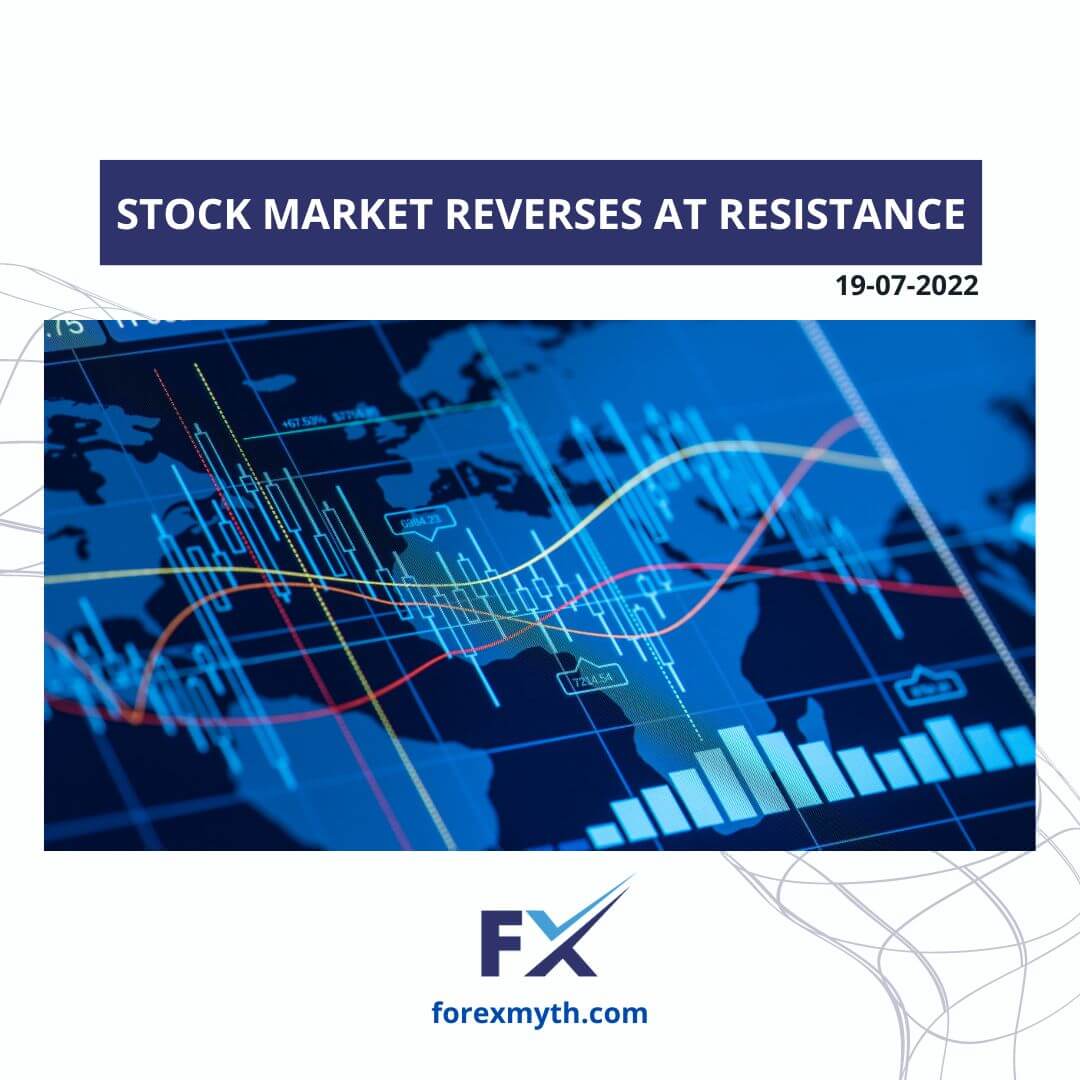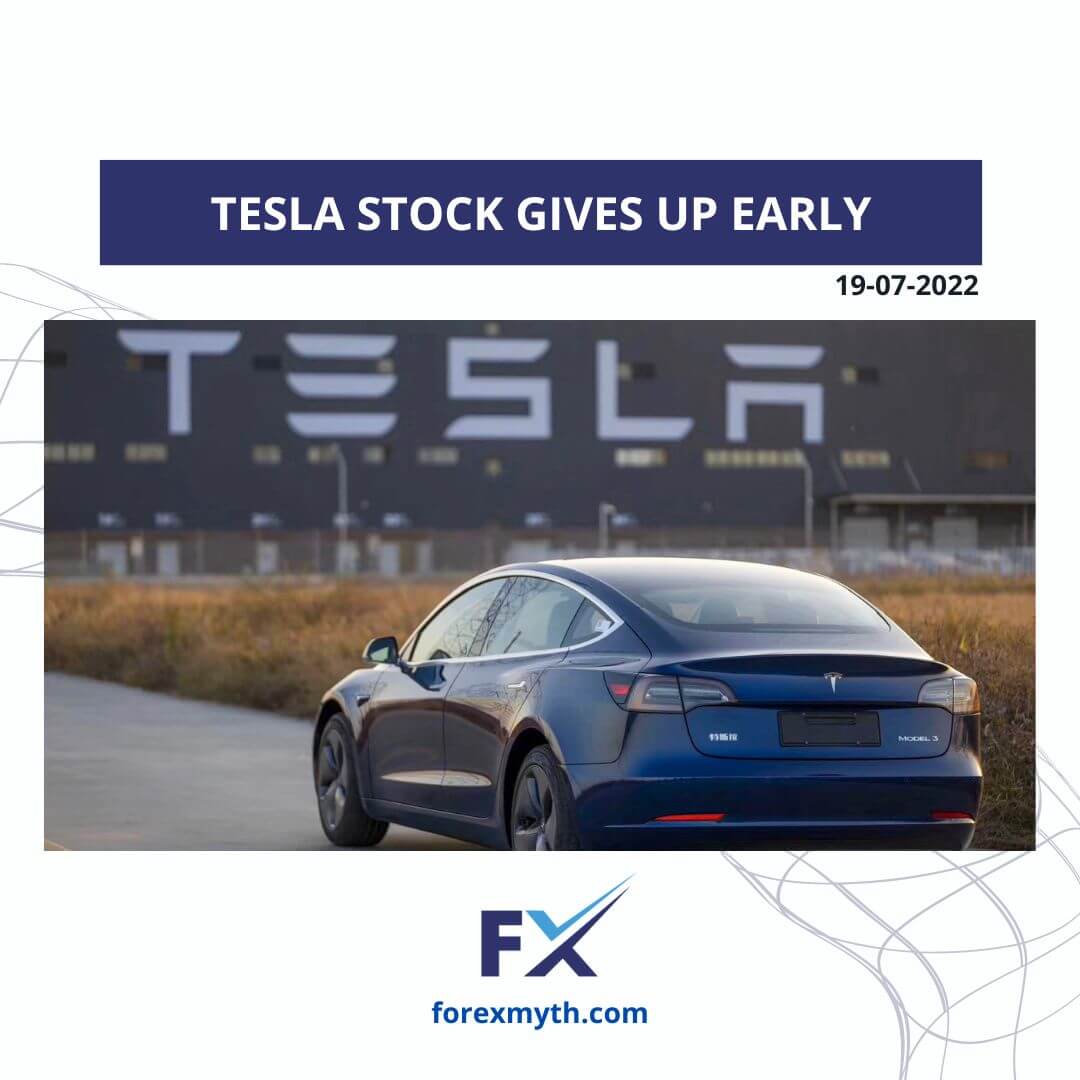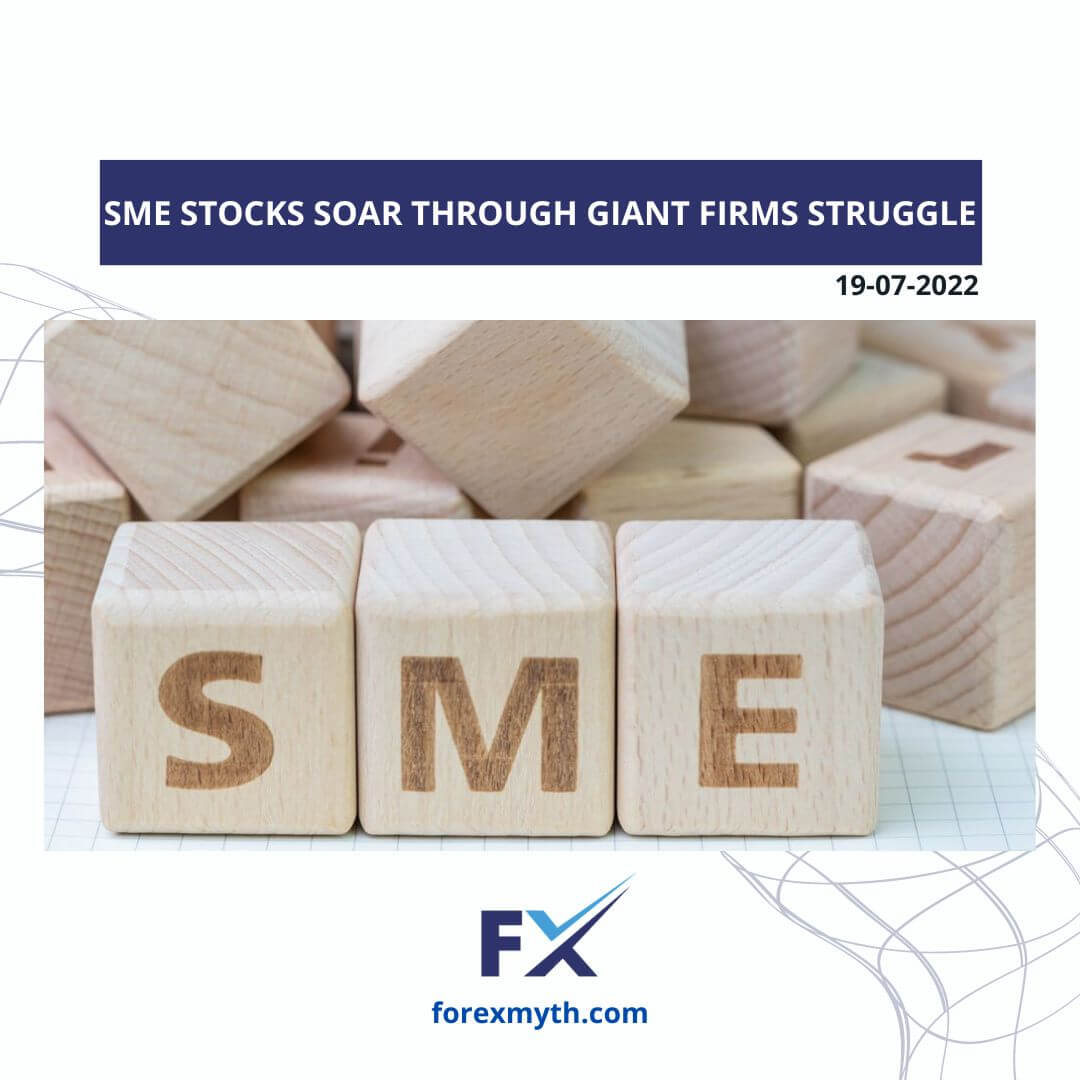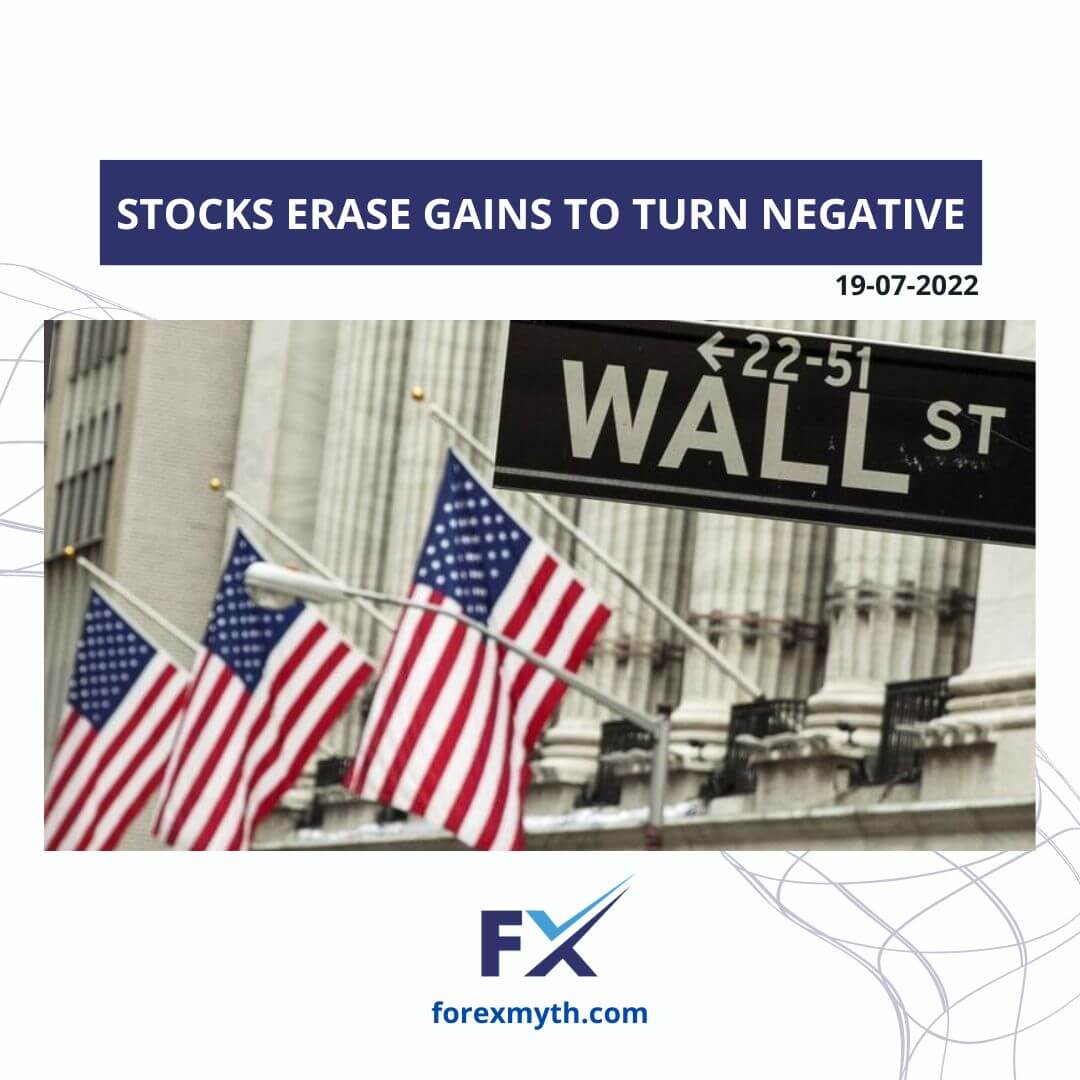-1658207037.jpg)
Stock market indexes gapped up to June resistance at the opening bell and filled those gaps in the early afternoon, trading back in the red. Financial stocks faded after a quick uptick, with better-than-expected Goldman Sachs (GS) earnings motivating early buying interest.

The Dow Jones Industrial Average is trading nearly flat at this hour, while the S&P 500 is down 0.1%. The Nasdaq composite has also relinquished its gains, now down 0.1%.
Stock market volume is mixed on this summer Monday, with NYSE trade levels down roughly 10% vs. the same time on Friday. Nasdaq volume has surged 29%, underpinned by a resilient small-cap rally.
Energy stocks are leading Monday's price action, fueled by a 4.2% rally in the August WTI crude oil contract. The broad-based SPDR Energy Select Sector ETF (XLE) is trading up 2.6%.
Chip stocks surged at the opening bell in reaction to growing optimism that Congress will finally set aside differences and pass the $52 billion funding bill. Both Nvidia (NVDA) and Advanced Micro Devices (AMD) are posting strong gains.
Bank of America (BAC) reported a mixed quarter, growing revenue by 5.7% year over year but missing profit estimates by a few pennies. Traders bought a quick dip after the news, continuing last week's positive reaction to bank results, and the stock is up 0.4%. - Investors.com
Tesla (TSLA) will report second-quarter earnings on Wednesday, with all eyes on how well the electric-vehicle maker managed costs amid soft delivery numbers. Tesla stock rose on Monday.
"With deliveries soft this quarter due to the China shutdown, Tesla's ability to preserve margins this quarter will be front and center for investors while all focus now shifts to the outlook for the rest of the year," Wedbush analyst Dan Ives said in a note to clients Monday.

Tesla delivered 254,695 vehicles in Q2, roughly in line with lowered Wall Street estimates. Ives estimates around 70,000 were wiped out of the quarter with Tesla's Shanghai plant shut down for two months due to Covid restrictions.
FactSet analysts expect deliveries to ramp up in the second half of 2022, with chip supply slowly increasing. Wall Street sees Tesla notching 1.4 million units by the end of the year. Of course, no one is really sure how Chinese officials might deal with another Covid surge.
Ives also notes that "while Giga Berlin and Austin factories are in significant ramp mode, this is a significant production capacity expansion for 2023 and beyond."
However, looming recession fears and accelerating competition from U.S.-based automakers as well as Chinese and European rivals could limit Tesla's growth.
Nevertheless, Ives says based on reservation orders globally for Model Ys, demand for Tesla vehicles is still outstripping supply by about 15% to 20%. - Investors.com
Shares of small capital-based companies surged abnormally on the Dhaka Stock Exchange (DSE) in the past month whereas the benchmark index of the premier bourse of Bangladesh, as well as blue-chip securities, has been in a bearish mood.
It is understandable why the wider market is falling: economic uncertainty is deepening owing to the Russia-Ukraine war, supply chain woes, runaway inflation, and re-surging coronavirus infections. And there is no end to the crisis in sight.

But the abnormal rise of SME stocks is raising questions and analysts are pointing their fingers at speculations and rumors.
The DSEX, the key index of the DSE, dropped 1.83 percent, or 119 points, in the last month. The DS-30, the blue-chip index representing reputed companies, plunged 2.54 percent, or 60 points.
However, the SME Index soared 51 percent, or 696 points. In fact, the index, which consists of 12 little-known companies, rocketed 350 percent in the last one year.
The DSE-SME, the small-cap board, was rolled out on April 30, 2019, in order to allow small and medium enterprises (SMEs) with a paid-up capital between Tk 5 crore and Tk 30 crore to raise funds from the stock market.
The move was applauded by analysts since most SMEs in Bangladesh don't have adequate access to finance although there are 78 lakh such enterprises in the country and they collectively contribute about 25 percent to the gross domestic product. - Thedailystar.net
One share of Google’s parent company Alphabet is suddenly a lot more affordable for Main Street investors — following a massive stock split that took effect Monday.
Alphabet split its two classes of shares by a 20-to-1 margin, a move that reduced the price of one share from just over $2,200 on Friday to about $112 on Monday.
.jpg)
The stock split doesn’t change Alphabet’s market capitalization. The company is still worth about $1.5 trillion, making it one of the most valuable firms on the planet.
But the split has two potential benefits. First, it may make Alphabet shares more enticing for everyday investors.
Second, it increases the odds that Alphabet could eventually be added to the prestigious Dow Jones Industrial Average.
That’s because the Dow, which lists only 30 stocks, is weighted by price — in contrast to the S&P 500 and many other indexes that weigh by market value.
So if the Dow were to include stock with a super high price, that would heavily skew the index’s daily performance.
Insurer UnitedHealth, which trades at more than $525 a share, currently has the highest weighting in the Dow, making up about 11% of the average.
Meanwhile, Apple is the 13th biggest Dow component, despite the fact that it has a market value of $2.4 trillion, nearly five times that of UnitedHealth.
Apple was added to the Dow in 2015, but only after a stock split in 2014 reduced its share price. - abc17news.com
U.S. stocks turned negative on Monday after an earlier rally after a report Apple would slow hiring.
The markets had been higher earlier as big banks kicked off another busy week of earnings and expectations eased about a big interest rate increase by the Fed.

At 2:06 PM ET, the Dow Jones Industrial Average was down 28 points, or about 0.1%, while the S&P 500 was down 0.2% and the NASDAQ Composite fell 0.1%.
Goldman Sachs Group Inc (NYSE:GS) beat expectations, its stock was up 1% after bond trading helped overcome weakness in M&A advisory.
Bank of America Corp (NYSE:BAC) rose 0.2% after its report also showed a slump in investment banking activity. Both had been up higher in earlier trading.
Apple shares (NASDAQ:AAPL) ticked down about 1% after reports it would slow hiring and spending, becoming the latest tech giant to make such a move as fears of an economic downturn hit the sector.
Investors are betting that the Federal Reserve won’t be as aggressive as some were betting last week after the consumer price index for June showed a jump of 9.1% for the 12 months ending last month.
High inflation stoked fears the Fed could jack up rates an uncharacteristically aggressive 1%, but now investors are expecting a 0.75 percentage point increase to match the move in June. That would still be one of the biggest moves since the 1990s.
Officials are trying to tame inflation, helped in recent weeks by a drop in gasoline prices, but still not enough for comfort.
Food prices remain elevated as well, and a prolonged heat wave in much of the country means air conditioning bills will eat into household budgets this month.
This week will also see earnings from Tesla Inc (NASDAQ:TSLA), Twitter Inc (NYSE:TWTR) and Netflix Inc (NASDAQ:NFLX).
Oil rose. Crude Oil WTI Futures jumped 4%, to $98.44 a barrel, while Brent Oil Futures crude also rose 4%, to $105.23. Gold Futures rose 0.6%, to $1,713 an ounce. - Investing.com
Ford Motor Company (F) stock is very cheap now at just 6 times earnings forecasts for 2003 with a 3.29% dividend yield.
In addition, short-term out-of-the-money calls can provide an additional 12.9% in annualized income. Let's look at this.

Ford is in the midst of making a transition to become a significant electric vehicle (EV) manufacturer.
In fact, it has already announced it will split its auto business into two units: Ford Blue, for traditional gas- and diesel-powered vehicles, and Ford Model E, for new electric models.
As a result, it says it will be able to produce 2 million EVs by 2026.
This compares with Tesla (T), the premier EV maker with over 70% market share in the U.S., which already is projected to make roughly 1.4 million EVs this year alone.
Analysts now forecast that Ford will make $1.92 per share this year and up to $2.06 in 2023. So, at today's price of $12.11, Ford stock trades for 6.31x 2022 earnings and 5.9x for 2023.
Moreover, Ford pays a dividend of 40 cents annually. That gives the stock an annual yield of 3.30%. In addition, investors can make good money with covered call income plays.
For example, the $14 strike price calls about one month out (Aug. 19) are priced at 13 cents at the midpoint.
So, since the stock trades at $12.11, this provides over 1% in additional income (i.e., 1.073%).
Moreover, on an annualized basis, that results in an annual yield of 12.9% to the patient investor (i.e., 12.876%), assuming it can be replicated each month.
So, if you add the 3.30% dividend to the 12.9% covered call income potential, Ford stock offers an attractive total yield possibility of over 16% (16.20%) annually.
This assumes that the out-of-the-money calls are not exercised if the stock were to rise to $14 by Aug. 19.
But, even if it does, the investor gets to keep the capital gain of almost $2.00 (i.e., $14.00/$12.11), or 15.6%.
Including the 1.073% covered call income the one-month potential gain will be 17.34%. That is a very good return for most investors, especially since it would be in one month. - Barchart.com
Health care stocks were mostly lower this afternoon, with the NYSE Health Care Index sinking 0.5% and the SPDR Health Care Select Sector ETF (XLV) down 1.0%.
The Nasdaq Biotechnology index was sinking 0.6%.

In company news, Eton Pharmaceuticals (ETON) rose over 11% after saying the US Food and Drug Administration has approved its Zonisade anti-seizure drug, triggering a $5 million milestone payment from Azurity Pharmaceuticals once the Boston-area distributor begins commercial sales of the epilepsy medication.
Eton also is eligible for product royalties and up to $15 million in additional milestone payments tied to combined sales of Zonisade and two other drugs covered by the companies' distribution pact.
Zai Lab (ZLAB) advanced 5.9% after the biopharmaceuticals company said its shares are now being traded on the Shanghai stock exchange after the Shanghai-Hong Kong Stock Connect program went active late Friday.
A similar two-way link between the Shenzhen and Hong Kong exchanges has similarly been in place since the company's dual listing in the US and Hong Kong became effective last month, it said.
Nabriva Therapeutics (NBRV) climbed 3.5% after the biopharmaceuticals company announced an exclusive deal with Turkish drug maker Er-Kim to distribute its Xenleta antibiotic in Bulgaria, Croatia, Czechia, Greece, Hungary, Poland, Romania, Slovakia and Slovenia.
Financial terms were not disclosed but Nabriva said Er-Kim is expected to also secure distribution rights for Xenleta in five more countries through a named patient usage program. - Investorsobserver.com